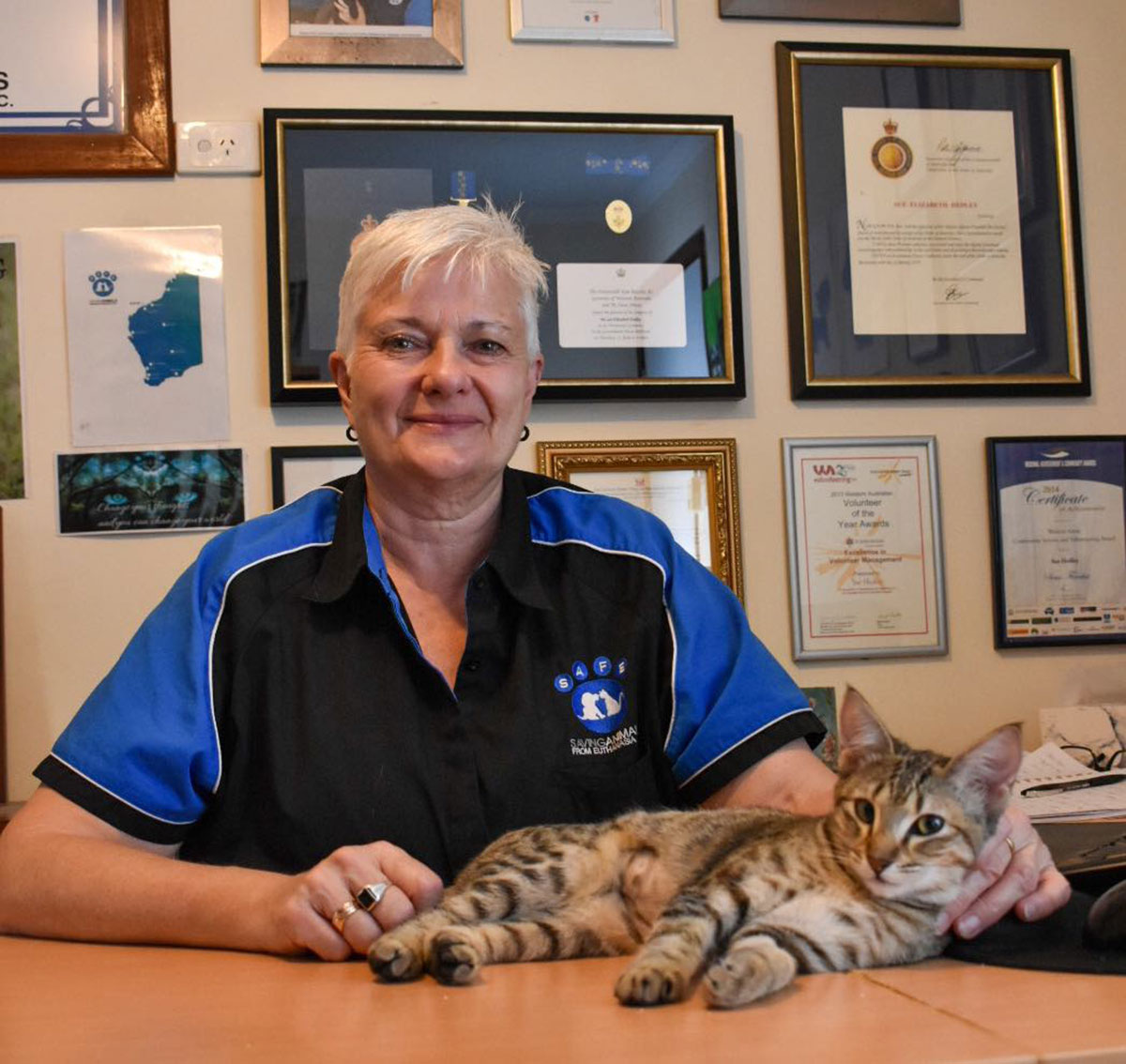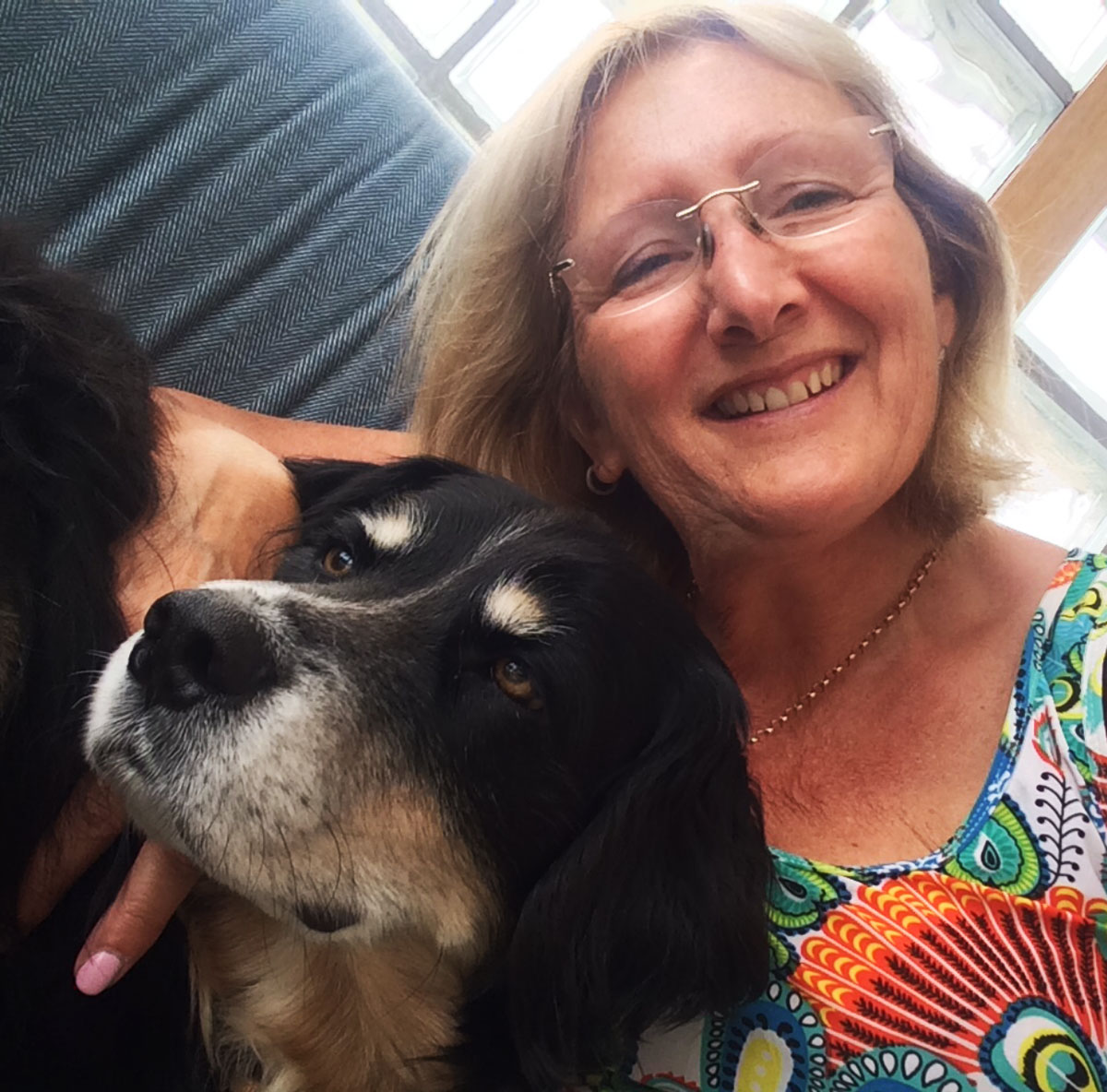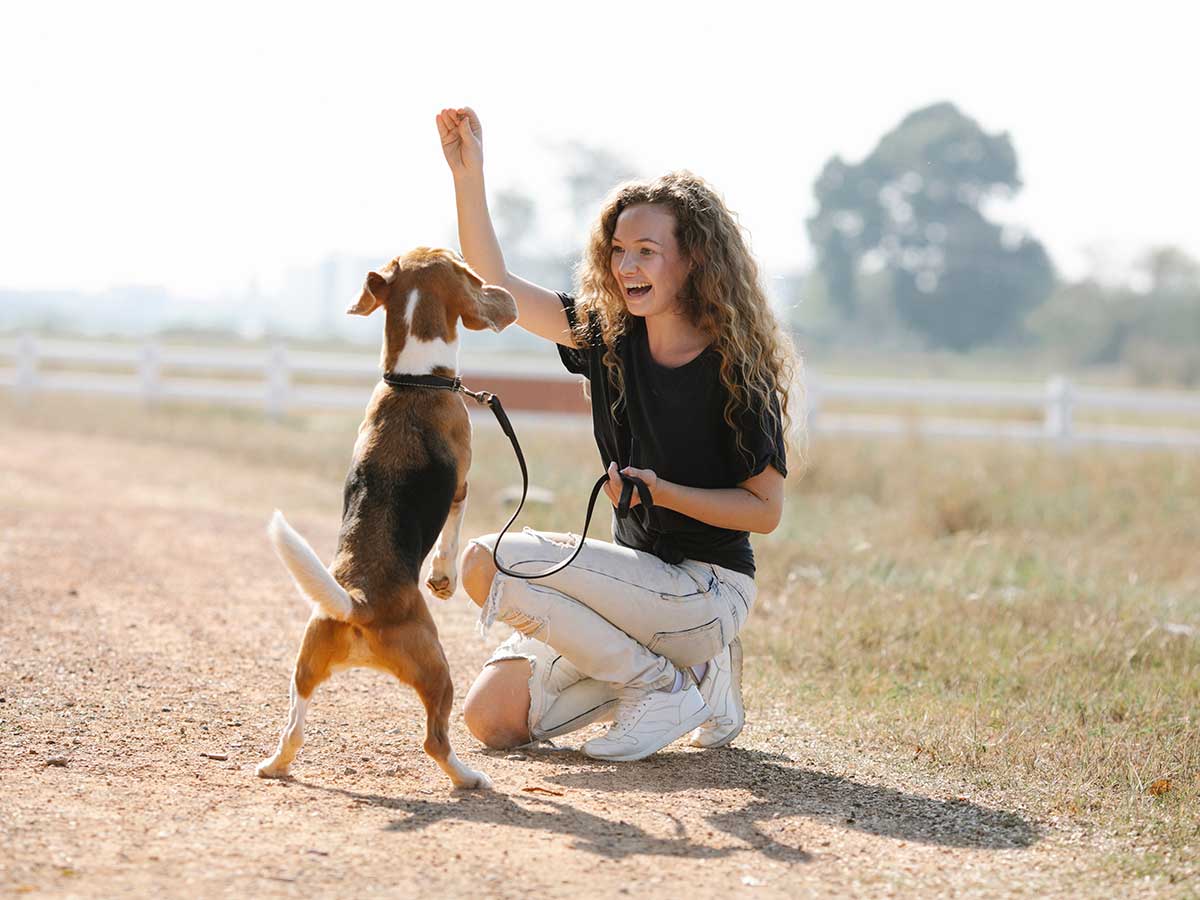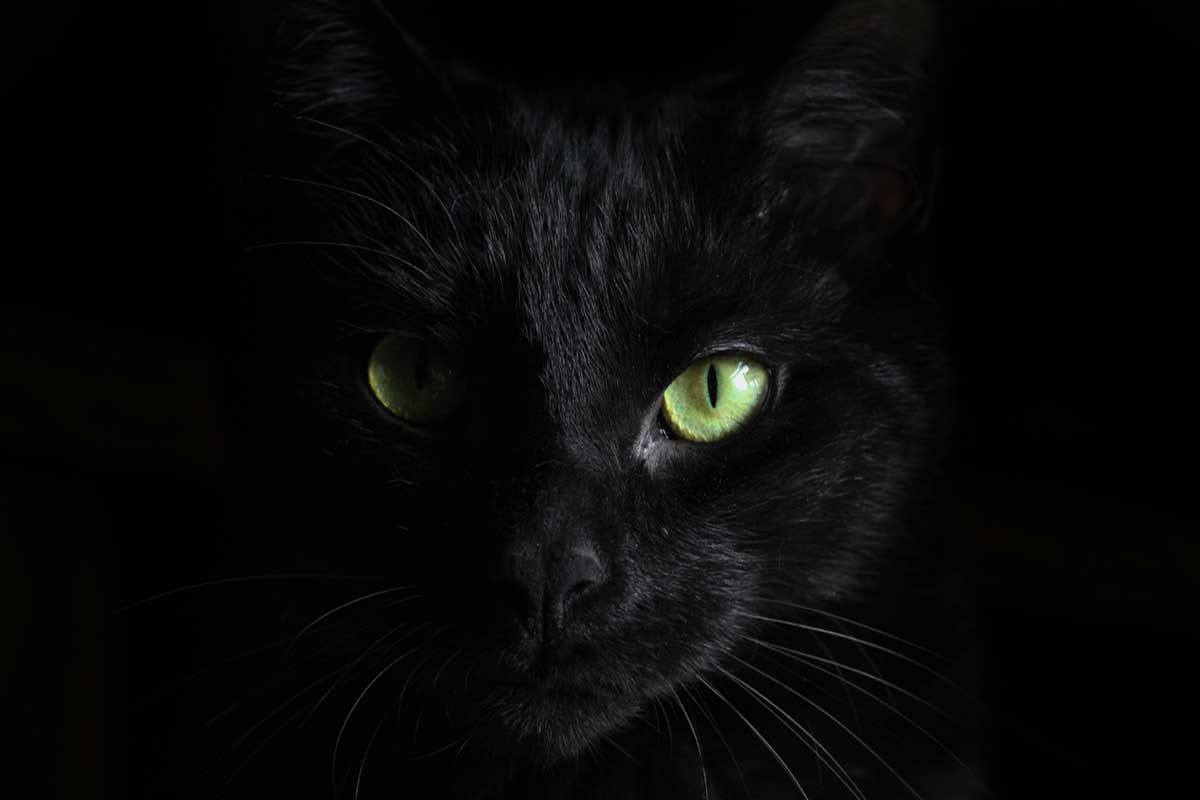Read Issue: https://issuu.com/theintermediagroup/docs/pet_industry_news_may_2022/8
Australia CAN CEO Trish Ennis said the organisation is proud and lucky to have an amazing array of talented people on the Board.
“The Board is incredibly dedicated to our mission and work in the community,” she said. “Together we promote the companion animal bond and responsible pet ownership through national campaigns, partnerships and initiatives, and work to achieve the highest possible standards and facilitate collaboration in activities that identify and communicate best welfare practice."

Sue Hedley OAM, SAFE Inc
Ms Hedley is also Founder of SAFE Inc, Australia CAN’s Western Australia member. Being a Director on Australia CAN’s Board with SAFE Inc as a member since 2014 has provided SAFE Inc with a voice for the domestic animals in WA, she said.
“Prior to SAFE Inc’s inception in 2003, the majority of homeless animals in WA had little opportunity, except those fortunate enough, to receive assistance by living in and around Perth. SAFE Inc is doing all we can to reach animals from the regional areas to ensure their welfare. Being part of a national organisation gives a far greater reach for the needs of animals in WA regional and remote areas,” she said.
Being an Australia CAN member has also provided the opportunity to introduce a different model nationally in animal rescue with no shelters and all animals in care in foster homes, explained Ms Hedley.
“The goals for SAFE Inc are to ensure every rehomable animal in WA has the opportunity for rehoming and to ensure networks across the state to achieve this. SAFE Inc aims to have purpose-built premises and Branch Coordinators funded to assist in ensuring sustainability long term,” she said.

Dr Megan Alessandrini, Dogs’ Homes of Tasmania
‘Dr Alessandrini is a Australia CAN Board delegate from Dogs’ Homes of Tasmania (DHOT) and as a director of DHoT for almost 20 years, she’s observed and also been part of a movement for change to improve the lives of dogs in their care and in the wider community.
“Companion animals now play a more important role in society than ever before,” she said. “Pets contribute to households and bring joy by giving unconditional love. Their loyalty and friendship give meaning to many people who might otherwise be lonely and at risk.
Dr Alessandrini explained that the Pet Friendly Australia strategy (PFA) developed by Australia CAN aims to strengthen the human-animal bond. One aspect of PFA addresses barriers experienced by renters by supporting reform similar to the current “opt out” pets in rental accommodation provisions in Victoria, she said.
PFA also encourages Australians to ‘adopt not shop’ by rehoming rescued pets and to reduce the staggering number of unplanned and unwanted litters by desexing all pets before their first season.
“Elderly people trying to manage in their own homes with support and caregivers or moving into residential settings should also have the option of animal companionship. Assistance to care for an animal companion needs to be available for residential or visiting pet programs,” she said.
“More appropriate purpose-designed public spaces and facilities for pets would also enrich pet lives and provide more opportunities for the human-animal bond to flourish.”
Dr Megan sees her current role as president of Australia CAN is a ‘brilliant opportunity’ to advocate for companion animal welfare, by providing information about how to enrich your companion animal’s life and give them everything they need in return for all they do for us.
“We aim to contribute to policy and practice through advocacy and awareness raising- to be at the top of the cliff preventing problems rather than fixing up the damage at the bottom of the cliff- although CANA and our affiliates do lots of that too,” she told Pet Industry News.’
Read more here
Photo Caption: Shadow visiting Lifeview residential care with Jess Lammeretz, Argyle Court Residential Manager
As they grieve deeply for their beloved pet left behind, the outcomes vary for the animals involved. Some pets are re-homed, others are surrendered to a shelter and some even euthanised.
In Victoria, residential care provider Lifeview is helping aged care residents live more active and vibrant lives with their beloved companion animals at their side. Located in Melbourne’s south-eastern suburbs at Chelsea, Emerald, Cranbourne and Wheelers Hill, the facility’s pet friendly atmosphere has inspired residents and staff alike!
“Pets are family, and many older people see their pet as a vital part of their life,” said Samantha Jewell, CEO of Lifeview. “Moving into aged care is a big enough change already without losing their beloved pet. Many aged care homes do not allow pets. At Lifeview, we believe in keeping people and their pets together.”
Residents must be able to look after their pet to a certain degree, such as feeding, changing their water, cleaning their cat’s litter tray and taking their dog for a walk. This helps residents maintain their independence and keep them more agile.
Lifeview also has visiting therapy pets and staff often bring in their pets as well, such as Shadow who comes in every day with Jess Lammeretz, Argyle Court Residential Manager, and is a big part of the home.
“Even our corporate office is pet friendly,” said Samantha. “We are all pet lovers, and it runs through the business as well.”
When residents can no longer care for their pet, their family must take care of the animal.
“We had a resident who couldn’t care for her cat any longer and one of our staff adopted the cat. She brings the cat to the home for a visit,” said Samantha.
“Pets bring a lot of joy and more positivity to their owners as well as to the residents around them. They help residents socialise and settle in, easing their move into the home and making new friends. Pets also assist with reminiscence therapy, as residents recall the animals they had when they were a child and share stories and help reconnect.”
A large body of research shows that pets help to reduce feelings of loneliness and alleviate the impacts on people’s physical and mental wellbeing.
Australia CAN is working closely with Lifeview to help other residential care facilities adopt this positive pet-friendly change to enhance the lives of the residents and their beloved pets.
Moving into aged care might mean having to give up your home and most of your possessions (which is already a challenging experience), but it should not mean you should lose your best friend and, potentially, lifeline.
For more information about Australia CAN’s Pets in Aged Care project, contact Australia CAN CEO Trish Ennis at tennis@australiacan.org.au
Leptospirosis is a zoonotic disease (affecting both animals and humans) caused by bacteria found specifically in infected animal tissues and urine. Infection with Leptospira bacteria may cause liver and kidney damage; however, it can also affect the nervous and respiratory systems, and in extreme cases cause death, according to the Australian Veterinary Association (AVA).

MEDIA RELEASE
January 2022
Companion Animal Network Australia appoints first CEO in its mission to support the human-animal bond and over 30 million Aussie pets and their families
Leading animal welfare charity Companion Animal Network Australia – Australia CAN (formerly Animal Welfare League Australia) appoints its first Chief Executive Officer, Trish Ennis, in its mission to support the human-animal bond and an estimated 30.4 million* pets and their owners across Australia.
Australia CAN’s President Dr Megan Alessandrini said, “Australia CAN has developed considerably with a range of strategies aiming to honour and strengthen the human-animal bond, and it was time to make this appointment. Trish is a perfect fit for Australia CAN.”
Ms Ennis joined Animal Welfare League Australia (AWLA) in December 2019 as National Executive.
“When the National Executive role came to my attention, I hadn't really heard of AWLA, and soon found out there were a number of Animal Welfare Leagues around Australia that didn't belong under the AWLA banner. It was clear there was great confusion out there about who we were and what we do,” she said.
Ms Ennis said she’s honoured to be appointed as CEO as she marks her second anniversary with the charity, celebrating her achievements to date.
“Companion Animal Network Australia launched in October 2020 and today clearly speaks to who we are – it is Australia’s only national peak body representing companion animals and the industry that works with them,” said Ms Ennis. “With a clear strategic plan to work to, we are now on the path of completing our initiatives. We are here to support the human-animal bond and the estimated 30.4 million* pets and their owners.”
Key projects in the works, Pets in Aged Care a priority
In August 2021, Australia CAN successfully launched www.rentwithpets.com.au, which works to decrease the number of pet surrenders due to archaic rental laws, whilst bringing landlords and tenants together.
Australia CAN’s next major projects include Pets in the Aged Care and Pets in Business, which is particularly poignant following COVID lockdowns with the increase of people getting pets and not wanting to return to the office full time, said Ms Ennis.
“Australia CAN is currently actively advocating in support of pets in aged care settings as a major priority for the organisation,” she said.
“Older people are often forced to say goodbye to their companion animals when moving into aged-care accommodation, causing immense grief. Furthermore, the outcomes for their beloved pets vary, including surrender to a shelter. Australia CAN is working with aged care experts to find ways of preserving the bond between people and pets in aged care accommodation.
“Australia CAN needs donor support to continue the work of our members and corporate support to develop our programs. I look forward to building Australia CAN and developing strong partnerships and donor support to allow our members to continue the amazing work they do with the animals and families whilst continuing to develop the programs.”
Australia CAN’s projects include:
Pet friendly homes
More rentals welcoming pets
More aged care services welcoming pets
New building developments that are pet friendly
Pet friendly communities
More pet friendly open spaces
Increasing transport options
Contributing to the role of school-based education
Pet friendly businesses
More pet friendly workplaces
Increasing pet friendly holiday accommodation options
More pet friendly cafes and restaurants
Airlines and car transport companies to become pet friendly
Responsible pet ownership
Better informed owners
Respect the rights of non-pet owners
Increasing the levels (coverage) of pet insurance
Better bereavement support at the end of a pet’s life
Develop accessible standards for responsible pet ownership
For partnership and sponsor enquiries, please email tennis@australiacan.org.au
Follow CANA on Facebook, Instagram and LinkedIn
Adopting a puppy is one of the greatest joys that families can experience, but unfortunately COVID-19 lockdowns have led to a rise in scammers taking advantage of Australians looking for a new furry family member. Their standard scam is to draw in unsuspecting buyers with fake photos, request as many payments as they think they can get away with, then disappear.
Australians have lost nearly $300K to puppy scams in 2020, particularly those seeking a furry companion online during the loneliness of social isolation, according to ACCC Scamwatch.
In fact, compared to the year before, ScamWatch recorded a fivefold increase for corrupt schemes to extort money out of consumers for dogs that did not exist!
That is why Companion Animal Network Australia has partnered with Puppy Scam Awareness Australia (PSAA) to raise awareness about puppy scams that cause a lot of heartbreak and anger, and unwittingly involve legitimate businesses in Australia.
PSAA is dedicated to bringing awareness about the thousands of pet scamming syndicates who prey on pet shoppers by exposing scam sites, supporting scam victims and providing resources to help educate and empower puppy buyers to protect themselves.
It can be difficult to know what is real or a scam. Knowing the scammers’ tricks can help you avoid the heartbreak of not getting the puppy you wanted.
Tips to keep in mind if you are looking to get a family pet:
- Scammers set up fake websites or ads on online classifieds and social media pretending to sell sought-after dog breeds. Email is the only way to contact them.
- Scammers take advantage of travel restrictions that prevent you from traveling to meet the puppy in person. They normally ask for up-front payments via money transfer to pay for the pet and transport it to you.
- Once you pay the deposit, a scammer will find new ways to ask for more money, such as claiming higher transportation costs to get across interstate borders. Unfortunately, once you make the payments, the seller will cease all contact.
- Scam websites can look quite convincing – try not to fall for the adorable puppy pictures they post. To avoid being scammed, only buy or adopt a pet you can meet in person.
- If the price looks too good to be true, it probably is!
- Research the seller online using the exact wording in the ad and do a reverse image search for pictures of the specific puppy to see if you can find matching images or text on multiple websites.
- If you are in doubt, seek advice from a reputable dog breeders association, veterinarian or local animal shelter.
- For tips to avoid fake websites and a list of fraudulent websites, visit the Puppy Scam Awareness Australia website
- For a guaranteed real pet to welcome into your family, contact a CANA member in your state.
If you think you are scammed, contact your financial institution right away. For more information, www.scamwatch.gov.au
Identity Stolen by Scammers
“I’m a legitimate business and scammers used my name, ABN and even superimposed my name on someone else’s Tasmanian driver’s license to show buyers as evidence. I also discovered 36 bank accounts with my name linked to it. Some people have lost money. I’ve reported it to the police, Cyber Crime, my bank and other authorities to try to track the scammers, but it’s hard to find them. Saddest part is getting innocent people and tugging at their hearts for a puppy, and I am unknowingly part of that.”
— Lesley, dog groomer, Tasmania
Devastated father, kids
“I was scammed $2,000 (trying to buy a puppy) and I feel sick. How they can do this to people, let alone my kids? I even checked and double checked everything, including the breeder number which was legit, plus video calls and emails, and still got scammed. Money is money comes and goes, but what they did with my boys’ emotions are hard to forget!”
— Diego, puppy buyer, NSW
Melbourne’s iconic organisation, Lort Smith Animal Hospital North Melbourne stands by their promise of never giving up on an animal capable of being rehomed.
On Nov 12th, this promise was proven right when, after 454 days waiting to be adopted, Tessa our five year-old Staffy cross Bull Mastiff has found her new forever home.
Tessa was the hero of a successful online social media campaign launched by Lort Smith back in July this year. The story of Tessa touched many hearts and she was in foster care with one of Lort Smith’s star volunteers – Kaye Cromie, who was also the finalist for Volunteer of the Year in the Pet Insurance Australia Companion Animal Rescue Awards.
The organisation’s ability to never give up on an animal is only possible due to the support of their many extraordinary and committed volunteers.
Lort Smith’s Head of Hospital, Dr David Cunliffe said, “Kaye has been a volunteer with Lort Smith for the last eight years. She supports the operations of the Adoption Centre in the laundry and kennels, is a foster carer and sits on our Volunteer Advisory Committee.
“If you’ve followed Tessa’s story, you might already know Kaye – she was Tessa’s foster carer for more than a year while she was waiting for her new home. Kaye helped Tessa come out of her shell and gain confidence, ensuring she had the best possible chance to be adopted.”
“This story is one of hope and success due to the commitment of Lort Smith and our volunteers who believe in finding homes for every animal and never giving up!” he said.
As the largest and busiest not-for-profit animal hospital in Australia Lort Smith has been a Melbourne institution serving the community for 85 years. The organisation is reliant on donations from the community and the pay it forward approach of full fee paying clients of their animal hospital.
A dataset of more than 4,300 cats representing 26 breed groups revealed seven personality and behaviour traits, with significant differences observed between breeds.
Cats are our most common pets, and feline behaviour is increasingly being investigated due to a range of behavioural problems. Another topic of interest in addition to behaviour traits is personality since it can be connected to behavioural problems.
Doctoral researcher Salla Mikkola from the University of Helsinki and the Folkhälsan Research Center says, “Compared to dogs, less is known about the behaviour and personality of cats, and there is demand for identifying related problems and risk factors. We need more understanding and tools to weed out problematic behaviour and improve cat welfare. The most common behavioural challenges associated with cats relate to aggression and inappropriate elimination.”
Seven feline personality and behaviour traits
The questionnaire, designed by Professor Hannes Lohi’s research group at the University of Helsinki and the Folkhälsan Research Center, surveyed personality and behaviour through a total of 138 statements.
The questionnaire included comprehensive sections on background and health-related information. By employing, among other means, factor analysis to process the data, seven personality and behaviour traits in all were identified.
- Activity/playfulness
- Fearfulness
- Aggression towards humans
- Sociability towards humans
- Sociability towards cats
- Litterbox issues (relieving themselves in inappropriate places, precision in terms of litterbox cleanliness and substrate material)
- Excessive grooming
“While the number of traits identified in prior research varies, activity/playfulness, fearfulness and aggression are the ones from among the traits identified in our study which occur the most often in prior studies. Litterbox issues and excessive grooming are not personality traits as such, but they can indicate something about the cat’s sensitivity to stress,” Mikkola adds.
Differences in the prevalence of traits seen between breeds
In addition to individuals, clear personality differences can be found between breeds. In other words, certain personality and behaviour traits are more common among certain cat breeds.
Professor Lohi said, “The most fearful breed was the Russian Blue, while the Abyssinian was the least fearful. The Bengal was the most active breed, while the Persian and Exotic were the most passive. The breeds exhibiting the most excessive grooming were the Siamese and Balinese, while the Turkish Van breed scored considerably higher in aggression towards humans and lower in sociability towards cats. We had already observed the same phenomenon in a prior study.”
The researchers wish to emphasise that no pairwise comparisons between breeds were carried out at this juncture.
“We wanted to obtain a rough idea of whether there are differences in personality traits between breeds. In further studies, we will utilise more complex models to examine factors that affect traits and problematic behaviour. In these models, we will take into consideration, in addition to its breed, the cat’s age, gender, health and a wide range of environmental factors,” Mikkola says.
Assessing reliability and validity
Feline behaviour and personality can be studied, for example, through questionnaires aimed at cat owners. Such questionnaires can measure feline behaviour in the long term and in everyday circumstances, which is impossible in behavioural tests.
Furthermore, cats do not necessarily behave in test settings in a way typical of themselves. Due to their subjective nature, the reliability of the questionnaires must be assessed before the data can be exploited further.
Professor Lohi says, “Internationally speaking, our study is the most extensive and significant survey so far, and it provides excellent opportunities for further research. The reliability of prior feline behavioural questionnaires has not been measured in such a versatile manner, nor are they as comprehensive as this one. Establishing reliability is key to making further analyses worthwhile and enabling the reliable identification of various risk factors.”
The researchers reached out to cat owners who responded to the questionnaire one to three months ago, requesting them to fill out the questionnaire again or ask another adult living in the same household to respond to the questionnaire regarding the same cat. The goal was to assess the questionnaire’s reliability both temporally and between respondents. Based on two additional datasets accumulated through this method, it was possible to evaluate the reliability of the questionnaire temporally and between respondents.
“By comparing the responses, we noted that the responses provided for the same cat were very similar, while the personality and behaviour traits were found to be reproducible and reliable. We also examined the validity of the questionnaire or whether it measures what it intended to measure. In these terms, too, the questionnaire functioned well,” says Mikkola.
The research conducted by Professor Lohi’s group will make it possible to identify genetic, environmental and personality factors relating to problematic feline behaviour.
The study is available here
Source: Press Release
The one-day family-friendly event held at the Launceston Silverdome promotes responsible pet ownership and the welfare of our native wildlife. All proceeds raised from the event will be donated to Tasmanian animal shelter.
The Dogs’ Home of Tasmania is calling all animal lovers to visit their stand, learn more about making their dogs’ lives more fulfilling through enrichment and find out about the wonderful pooches available for adoption at their Launceston shelter. Plus, shop for goodies to pamper their doggies at home!
“Our mission is simple – Adopt Don’t Shop. The most rewarding thing someone can do is adopt a dog. They aren’t damaged goods; some need a second chance, others need a first chance, and we are more than happy to help them find their loving home,” said DHoT CEO Michael Sertori.
“Also, we are heavily promoting enrichment because dogs are like kids; they get bored! They need entertainment and this can be achieved with toys and food or - even better – combining them! We will have dog treats, snuffle mats, licki mats and other enrichment items for purchase and can show people how to use it.”
DHOT will also have recipes for you to take home and try out!
“Kids can also guess how many dog biscuits are in our mystery jar and enter our competition to win a doggie goodie hamper!” said Mr Sertori.
DHOT is not government funded and do rely on the public for support.
“Donating to us helps us maintain our Homes and keep vital maintenance and improvements up to date,” he said. “Due to the harsh cleaning products we use, it starts to erode away at our kennels and equipment, and we are constantly doing upgrades so our dogs are happy, safe and comfortable.”
DHOT will have a donation box at their stand, but donations can be added to purchases or contributions made via the website www.dhot.com.au.
For more information about the expo, visit www.taspetexpo.com.au
WAScamNet urges pet lovers to be suspicious about:
- Great ‘deals’ served to you via an Internet search or pop-ups
Scammers hope to catch you out when you impulse-buy after seeing a bargain.
- Unfamiliar or new websites
Look for a copyright year on the website home page; although this date can also be faked.
- No address or business details
Websites that do not list a full physical address, telephone number or ABN, or if these details cannot be verified.
- Insecure payment methods
This includes direct bank transfer or wire transfer.
- Dodgy-looking website content
Pixelated photos, spelling errors and other clues that you may be looking at a copycat site of a real online business.
WAScamNet warns consumers not to purchase puppies from the following fraudulent websites – see list here
About WAScamNet
Developed by the Department of Mines, Industry Regulation and Safety, WA ScamNet profiles the most prevalent scams targeting Western Australians and provides information on different types of scams, how to recognise scams, and what to do if you have received a scam. It also provides links to other useful websites.
Photo credit TR Photography
Our four-legged friends can also get lost or poisoned by chocolates and candy, says Trish Ennis, Chief Executive of Companion Animal Network Australia (CANA).
“Black cats are particularly at risk around Halloween, some falling victim to sadistic people who think it cool to harm, torture or even kill cats,” she said.

Here are some tips to keep your pets safe on Halloween:
- Keep your pets safely indoors on the days leading up to Halloween and especially on Halloween night! Pranksters love to tease dogs and can even be cruel to them. Also, cats roaming the street at this time is not only at risk of being abducted but also of being panicked by goblins and vampires on the hunt for candy.
- Keep your pets on a leash or in a safe area of the house, away from the front door area to prevent dashing out the door in fear. Be mindful that a dog’s behaviour, when confronted by children in masks, is unpredictable and can result in a bite.
- In case your dog or cat manages to escape, ensure they are wearing a collar with a proper identification tag and/or microchip, which can be a lifesaver and increase the chances that they will be returned to you.
- Keep your pets away from pumpkins with candles burning inside, as it’s easy for them to knock it over with fear or excitement.
- Keep wires and cords from electric lights and other decorations out of reach. If chewed, your pet might suffer cuts or burns, or receive a possibly life-threatening electrical shock.
- If you intend to dress up your animals, please take care that the costumes don’t pose any dangers. Not only can costumes cause unnecessary stress and discomfort to pets, but ribbons and buttons can also be dangerous if swallowed or ingested.
- Keep lollies away from your dog. Chocolate is highly poisonous and even fatal for dogs. Also, remove tin foil, candy wrappers and artificial spider webs which can be hazardous if eaten.

For any concerns, call your nearest 24 hour veterinary clinic.
